In general, it is highly critical for women to give special attention to menstrual hygiene.
“Good Menstrual Hygiene empowers women and girls to rise”.
- Poor feminine hygiene will lead to urinary infection, vaginal irritation, and cervical cancer.
- For good Menstrual Hygiene, each and every woman must know how to keep themselves clean.
- Personal hygiene and physical health -improve women’s health status during menstruation.
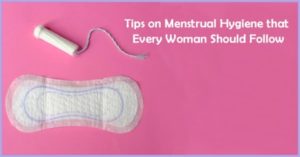
This article highlights certain essential health tips for women’s hygienic menstruation.
Select good brands of sanitary pads

- Buy a good sanitary napkin brand according to your skin type.
- Sanitary pads are essential for personal menstrual hygiene.
- Avoid using plastic-coated sanitary pads.
Bad Effects of Plastic-coated sanitary pads
- Rashes
- Scratchiness
- Boils
Good brands of sanitary pads -“Vespa”, Whisper”, “Stayfree”, etc.
Regular change of menstrual pads per day
- Change the sanitary napkins within four to six hours.
- This is a cardinal rule for personal vaginal hygiene.
- Changing the pads regularly is a good habit.
- Don’t wear the same pad for more than eight hours.
Why do you need to change your menstrual pads regularly?
- When the menstrual blood is released, it increases the warmth of the blood.
- Hence, it causes irritation, rashes, and urinary infection.
- So, change your menstrual pads regularly.
Wash properly
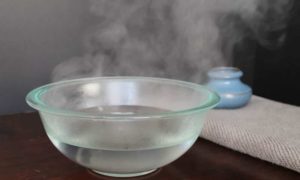
- After removing your sanitary napkin, wash your private parts properly.
- If you do not wash properly, you will suffer from many infections and irritations.
- Do not use soap and artificial hygienic products for washing.
- Artificial products lead to viral infection and bacterial growth.
- Use warm water regularly to wash your genital areas.
- To keep your genital area dry, use antiseptic powder.
Bathe at least twice a day
- Take a bath in order to avoid bad odors especially during menstruation.
- After bathing, clean your bathroom with disinfectants.
- By doing so, your family members will not be infected.
Use proper, comfortable, and clean underwear
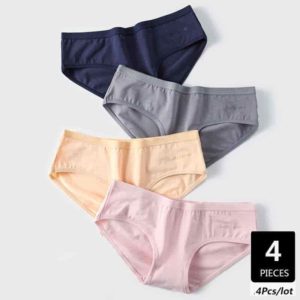
- Wear comfortable and clean underwear on menstruation days.
- If you wear fabric underwear, it will lead to infection.
- To avoid hurting your skin, wear comfortable and soft cotton underwear.
Proper disposal of sanitary pads
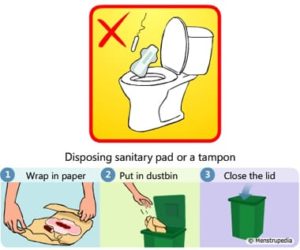
- Wrap your pads properly before throwing them or burying them in the soil.
- Use newspapers to wrap your used sanitary pads.
- Don’t flush them.
- Flushing will lead to blockages and spreads viral and bacterial infection.
- After wrapping and disposing of the sanitary pads, wash your hands properly.
- Wash your hands with warm water and soap after changing your pad.
- Throw the pads into a common dustbin.
Reasons for washing hands after disposal of sanitary pads
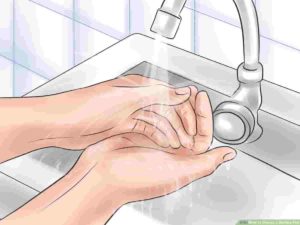
- We touch the stained areas while wrapping the sanitary napkins.
- Hence, washing your hands is very important for improved health hygienic status.
Stick on to one method of sanitation
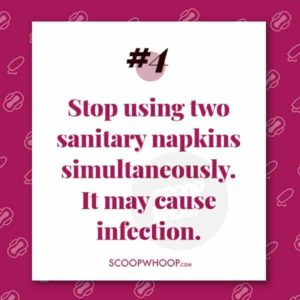
- It is not advisable for women with heavy blood flow to use two pads simultaneously.
- It leads to infection.
- So, it is better to use one pad of the same brand and change it regularly.
- Stick on to the cardinal rules to stay healthy.
Sustainable Alternatives for hygienic menstruation
- To reduce the amount of plastic waste, scientific menstrual solutions are being made available.
- Biodegradable pads are made using natural ingredients.
- Natural Ingredients-corn starch, bamboo fiber, etc.
Recommended list of advanced alternative sanitary products
1)Menstrual cups
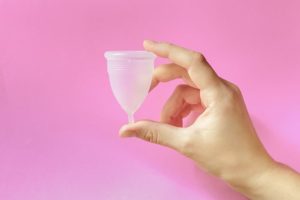
- Made of flexible, medical-grade silicone.
- Menstrual cups are inserted into the private part.
- Good brands of menstrual cups-“Lunette” and ” Moon cup.”
- Suitable for women of all ages.
- Cheap and affordable.
- It can last up to two years through proper maintenance and care.
- They are very popular alternatives.
2)Period Pants
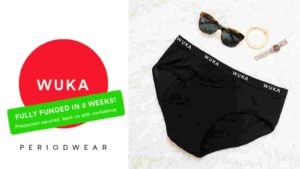
- Best Brand(Period pants) – “Thinx “and ” Wuka”.
- These are absorbent underwear.
- They are heavy flow pants.
- Suitability- women suffering from the heavy menstrual flow.
- Washable and Reusable.
3)Reusable pads
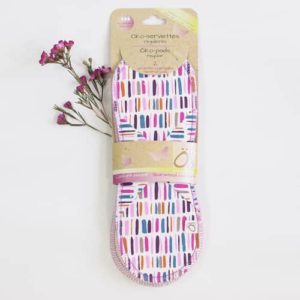
- Reusable pads are washable.
- They are made of absorbent fabric.
- Available market brands- “Earthwise girls” and “Cheekywipes”.
- Suitable for all women(based on light, medium, and heavy blood flow).
4)Plastic-free pads and Tampons
- For biodegradable disposable items, purchase plastic-free pads.
- They are made out of cotton and natural fibers like corn starch and bamboo fiber.
- These pads are free of harmful chemicals.
- They are soft, leak-proof, and comfortable.
Bamboo pads

- Wrapped in a biodegradable disposable pouch.
- Discarded in a hygienic way.
- Very expensive.
Tampons
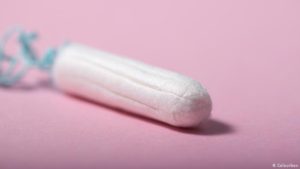
- Provides better protection.
- Ideal for women.
Menstrual Disc

- They are very similar to a menstrual cup.
- Provides protection for a longer period of time.
- It is for one-time use.
- It should be discarded immediately.
Balanced Diet
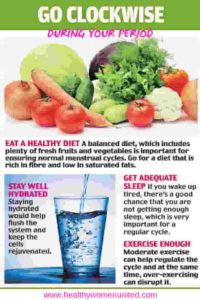
- Women should consume a well balanced and nutritious food.
- Add fruits, vegetables, and proteins to your diet.
- To reduce pain, drink six liters of water during the menstruation period.
- Check and see whether your periods are regular.
- For abnormal smell or color change (blood flow), contact a specialist.
Menopause
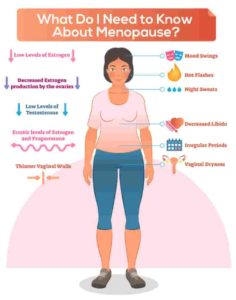
- End of a women’s menstrual cycle.
- It marks the end of women’s reproductive years.
- Menopause-a regular part of aging after the age of forty.
Signs of menopause
- Blushing and sweating.
- Mild to severe flashes.
Symptoms
- Crankiness.
- Depression.
- Headache.
- Joint and muscle pain.
- Hair loss.
- Weight gain.
- Tiredness.
Problems faced by women who suffer from menopause
- Uneven periods.
- Trouble sleeping.
- Emotional changes.
- Dry mouth.
- Dry eyes and skin.
- Sore breast and dryness in the genital area.
Types of menopause
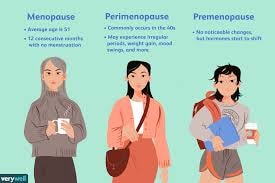
- Perimenopause–Starts eight to ten years before menopause.
- Post-menopause-a stage after menopause.
- Menopause -a normal part of aging and end of reproductive years.
Note: Women need not worry about menopause.
Natural ways for the relief of menstrual cramps
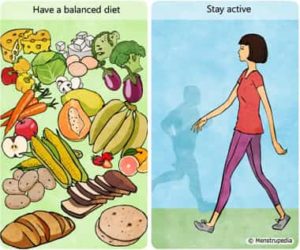
- Drink lots of pure water.
- Take a lot of fruit juices like lemon juice, mint juice, cucumber juice, etc.
- Skip potato chips and doughnuts.
- Add ginger to your tea.
- Cherries, blueberries, tomatoes, and bell peppers can be added to your diet.
- In order to avoid menstrual pain, take a handful of fenugreek and swallow it with water.
- Add fish in your diet.
- To avoid menstrual cramps, consume calcium-rich beans, dark leafy greens, and almonds.
Foods to be avoided during menstruation
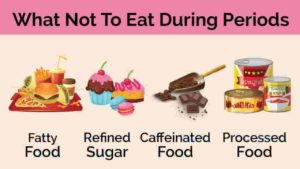
- Skip refined foods like sugar, bread, and pasta.
- Avoid junk foods like french fries, cookies, margarine, and onion rings.
- Reduce drinking coffee during your menstrual days.
“Education about menstruation changes everything”.
Dear Women,
“Menstruation is a natural gift from God.
So, never feel shy or ashamed of menstruating.
Use your period as an opportunity to treat yourself!”
Thank You.
Stay Home!! Stay Hygienic.